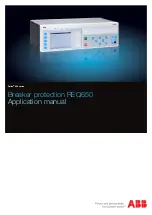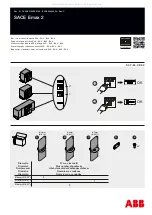
8
Instruction Book
IB182012EN March 2017 www.eaton.com
50DH-VR-50AXU / 50XU / 75U / 75ARU - 600 / 1200A
Replacement Circuit Breaker
SECTION 3: RECEIVING, HANDLING, AND
STORAGE
Type 50DH VR-series circuit breakers are subjected to complete
factory production tests and inspection before being packed. They
are shipped in packages designed to provide maximum protection to
the equipment during shipment and storage and at the same time to
provide convenient handling. Accessories such as the maintenance
tool, cell code plate, (if applicable) etc. are shipped with the circuit
breaker (Figure 3.1).
3.1 RECEIVING
Until the circuit breaker is ready to be delivered to the switchgear
site for installation, DO NOT remove it from the shipping crate. If the
circuit breaker is to be placed in storage, maximum protection can
be obtained by keeping it in its crate.
Upon receipt of the equipment, inspect the crates for any signs of
damage or rough handling. Open the crates carefully to avoid any
damage to the contents. Use a nail puller rather than a crow bar
when required.
When opening the crates, be careful that any loose items or
hardware are not discarded with the packing material. Check the
contents of each package against the packing list.
Examine the circuit breaker for any signs of shipping damage
such as broken, missing or loose hardware, damaged or deformed
insulation and other components. File claims immediately with the
carrier if damaged or loss is detected and notify the nearest Eaton’s
Electrical Services & Systems office.
Tools and Accessories
Maintenance Tool:
This tool is used to manually charge the closing
spring. One maintenance tool is provided with each vacuum unit
replacement circuit breaker. (Style# 8064A02G01)
Racking Handle:
The racking handle is used to drive the racking
mechanism which moves the circuit breaker into and out of the cell.
The original OEM racking handle will interface with the VR-Series
replacement circuit breaker racking mechanism and is therefore not
provided as part of the vacuum replacement circuit breaker.
Secondary Connection Block Extension Cable:
The extension
cable can be used to connect the circuit breaker to a “test cabinet”
or to the switchgear cell’s secondary receptacle block so that the
circuit breaker can be electrically operated while not installed in
the switchgear cell. This extension cable is the same one provided
with the original Westinghouse circuit breaker and is therefore not
included as part of the VR-Series circuit breaker.
Turning Dolly:
Optional item used to help maneuver circuit breaker
when out of structure.
3.2 HANDLING
WARNING
DO NOT USE ANY LIFTING DEVICE AS A PLATFORM FOR PERFORMING
MAINTENANCE, REPAIR OR ADJUSTMENT OF THE CIRCUIT BREAKER OR
FOR OPENING, CLOSING THE CONTACTS OR CHARGING THE SPRINGS.
THE CIRCUIT BREAKER MAY SLIP OR FALL CAUSING SEVERE PERSONAL
INJURY. ALWAYS PERFORM MAINTENANCE, REPAIR AND ADJUSTMENTS
ON A WORKBENCH CAPABLE OF SUPPORTING THE CIRCUIT BREAKER
TYPE.
50DH-VR circuit breaker shipping containers are designed to be
handled either by use of a rope sling and overhead lifting device or
by a fork lift truck. If containers must be skidded for any distance, it
is preferable to use roller conveyors or individual pipe rollers.
Once a circuit breaker has been inspected for shipping damage, it
is best to return it to its original shipping crate until it is ready to be
installed in the Metal-Clad Switchgear.
When a circuit breaker is ready for installation, a lifting harness in
conjunction with an overhead lift or portable floor lift can be used
to move a circuit breaker, if this is preferable to rolling the circuit
breaker on the floor using self contained wheels. If the circuit
breaker is to be lifted, position the lifting device (lifting straps should
have at least a 1600 pound capacity) over the circuit breaker and
insert the lifting harness hooks into the circuit breaker side openings
and secure. Be sure the hooks are firmly attached before lifting the
circuit breaker. Stand a safe distance away from the circuit breaker
while lifting and moving.
Figure 3.1.a. Typical Manual Charge Handle
Figure 3.1.b. Rotary Racking Handle
Figure 3.2. Lifting 50DH-VR (150DH-VR Shown)









































